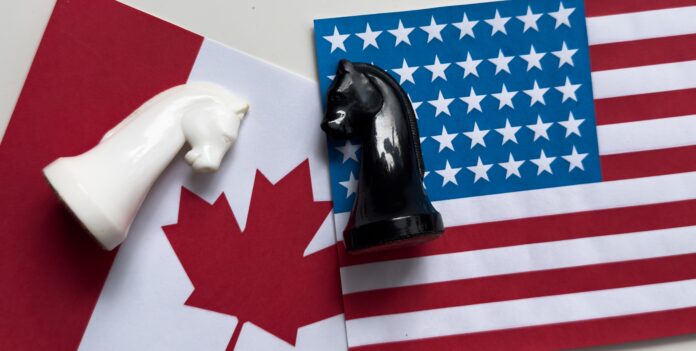
Canadian shoppers are now shunning American grocery products as trade tensions escalate, delivering a significant economic blow to U.S. businesses and border shops.
At a Glance
- Empire Co. Ltd. reports sales of U.S. products dropping as Canadians prefer local goods to support their economy and avoid tariffs
- A British Columbia border shop has experienced an 80% drop in sales due to declining American product purchases
- Major Canadian retailers are reducing U.S. imports and prominently featuring Canadian-made products
- The “Buy Canadian” movement is gaining momentum in response to tariffs imposed by President Trump
- Canadian grocery chains are shifting supply chains to accommodate consumer demands for non-American products
The Great Canadian Shopping Revolt
Canadian consumers are increasingly turning their backs on American-made products, with major retailers reporting significant declines in U.S. goods sales. This “Buy Canadian” movement isn’t just some passing trend – it’s a direct reaction to the tariff battle initiated by Washington’s economic mismanagement. Unlike the left’s constant push for globalism when it benefits their agenda, Canadians are exercising their free market choice to support their own economy during a trade dispute that never needed to happen.
Michael Medline, CEO of Empire Co. Ltd., which operates grocery chains like Sobeys and Safeway, confirmed this dramatic shift in consumer behavior. Typically, about 12% of Empire’s products come from the United States, but that percentage has been steadily decreasing over the past year as Canadians deliberately choose domestic alternatives. The company is now actively realigning its supply chain to accommodate this consumer-driven change, though certain seasonal produce remains challenging to source locally during Canadian winters.
Border Businesses Bearing the Brunt
The impact of this consumer shift is devastating small businesses that rely on cross-border commerce. Peace Arch Duty Free, a shop located at the British Columbia border, has reported an astounding 80% drop in sales. Owner Peter Raju is now faced with reducing staff hours and contemplating weekday closures just to stay afloat. This isn’t some distant economic statistic – these are real American jobs and livelihoods being destroyed by policies that have triggered an unnecessary trade war with one of our most reliable allies and trading partners.
Corporate Canada Shifts Strategy
Major Canadian retailers have recognized the opportunity to capitalize on surging economic nationalism. Companies like Canadian Tire are actively reducing their reliance on U.S. suppliers and prominently featuring domestically produced goods. Even tech platforms like Shopify are introducing new features to help Canadian merchants highlight local products. This coordinated effort across the Canadian retail landscape demonstrates how quickly free market forces respond to government overreach in trade policy.
Despite these challenges, Empire reported a third-quarter profit of $146.1 million with sales rising to $7.73 billion, supported by a 2.5% increase in same-store sales. E-commerce sales grew by an impressive 72%, driven by in-house delivery service Voila and partnerships with third-party services like Instacart and UberEats. This success demonstrates that companies that respond quickly to changing market conditions can thrive even during periods of international tension – a lesson in adaptability that Washington bureaucrats would do well to learn.
The Long-Term Economic Impact
The Canadian federal government isn’t standing idle while this economic realignment takes place. They’re preparing an aid package for businesses affected by the tariffs, further entrenching the division between our economies.
The sustainability of the “Buy Canadian” movement will likely depend on how long these trade tensions persist. History shows that consumer nationalism eventually fades once conditions normalize, but if tariffs remain in place long enough, permanent changes to supply chains and shopping habits could emerge. American exporters and border businesses need Washington to focus on creating fair trade conditions rather than catering to special interests and ideological agendas. Our economic prosperity depends on sound policy, not political posturing.
Sources:
https://financialpost.com/news/retail-marketing/sales-of-u-s-products-dropping-empire-grocers
https://finance.yahoo.com/news/border-shop-sees-80-sales-213100309.html
https://www.newsmax.com/newsfront/american-goods-groceries/2025/03/13/id/1202727






















